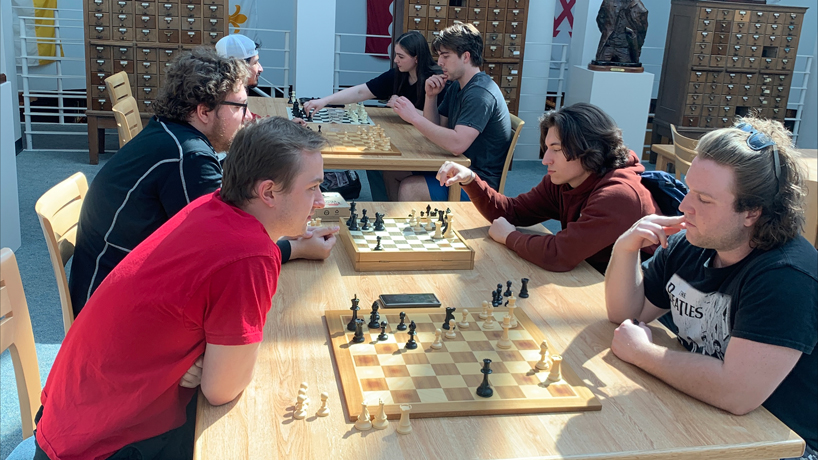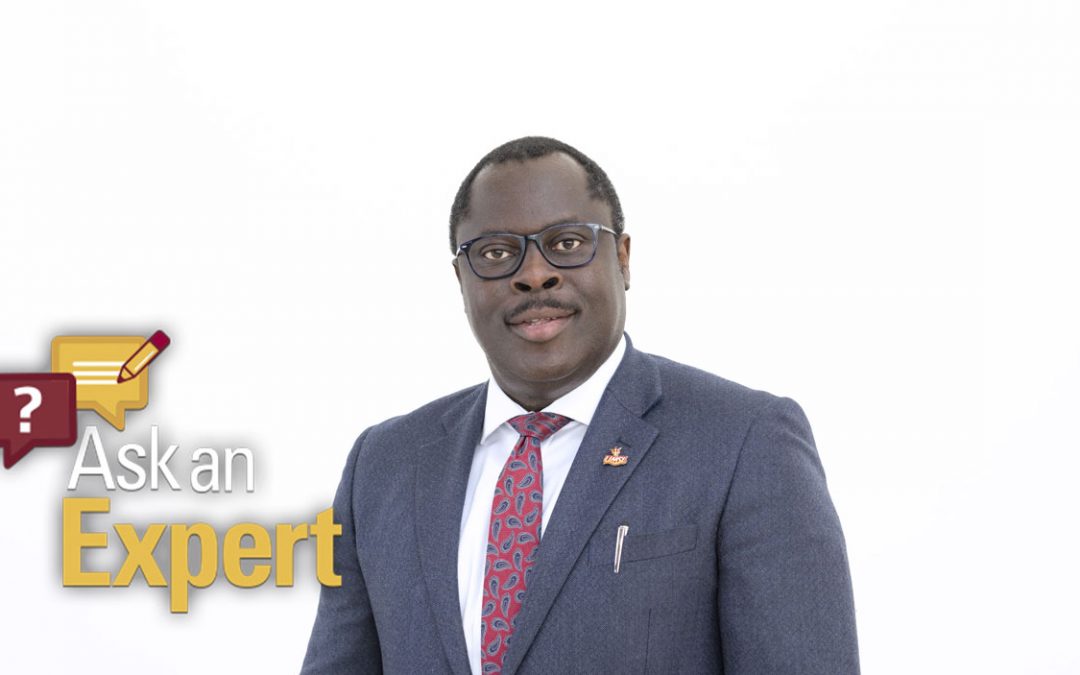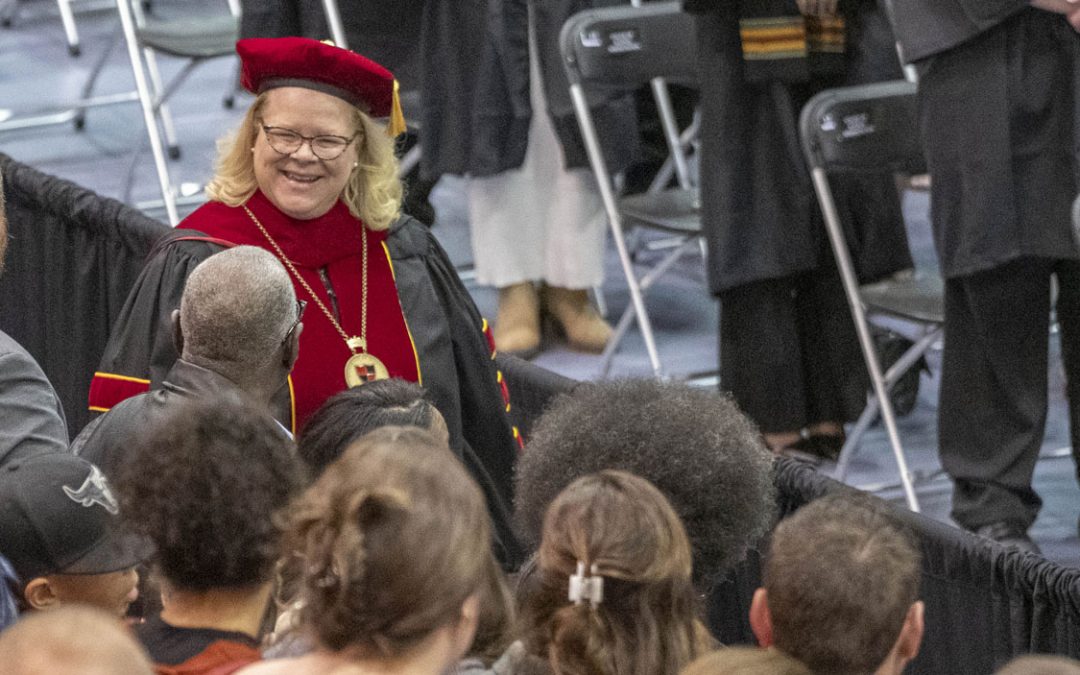
Members of the UMSL Chess Club play against each other in the St. Louis Mercantile Library this spring. Corey Hancock, a counseling PhD student, started the club last semester. During the coming academic year, members will continue meet weekly, but Hancock envisions expanding the scope of the club and taking advantage of the university’s proximity to the St. Louis Chess Club. (Photo courtesy of Corey Hancock)
When Corey Hancock arrived on the University of Missouri–St. Louis campus, one of his first stops was the Office of Student Involvement.
Hancock, who is pursuing a PhD in counseling in the College of Education, inquired about joining the university’s chess club. An avid chess player since his youth, he was shocked to learn there wasn’t one. The news was somewhat confusing to him, considering that St. Louis is home to the World Chess Hall of Fame and the highly regarded St. Louis Chess Club.
“They said there’s no chess club, and I’m like, ‘What? Please tell me how to get that organized,’” Hancock recalled. “Through that process, someone had connected me with a few of the other students that were already at UMSL playing. They just weren’t established as an official club.”
The UMSL Chess Club was recognized as an official student organization shortly after spring break this past semester. Hancock noted that interest in the club was strong from the outset, attracting about 15 members. By the end of the semester, the organization’s membership had doubled to 30 members.
Hancock aims to capitalize on that momentum during the coming academic year. The UMSL Chess Club will continue to meet weekly, but Hancock envisions expanding the scope of the club and taking advantage of the university’s proximity to the St. Louis Chess Club.
“What I would like to see is all those resources that are readily available, structured in such a way that someone can come in and they have the option to take it seriously – play in tournaments, have funding to go outside of UMSL, maybe go and carpool to the St. Louis Chess Club,” he said. “I’ve been so surprised by how many people have not been to the St. Louis Chess Club because players all around the world are familiar with the work done by this organization and many have traveled here to learn and to play.
“There’s so much there – the hall of fame. There’s the art museum; there’s a chess café; there’s a tournament hall; there are broadcasters that go in and speak about chess. There’s so much just sitting there in the heart of St. Louis. I want a big chunk of that to also be part of UMSL.”
Hancock’s interest in the game began at a young age in Baltimore County, Maryland. He joined his first chess club in fifth grade as a way to socialize and learn the fundamentals, but it was his middle school club that left a lasting impact.
“I just loved the environment that we had, maybe like 30-40 kids in there,” Hancock said. “It was thanks to our instructor who was a great mentor, very kind, patient, passionate man, and I felt safe there. I’m very introverted at heart, and it was nice to have an opportunity to play with others without having to speak – the social skills were just not there yet. But it was nice to play, and one of the things that started happening, as I got better at the game going into seventh grade, other players, new players especially, coming in to learn how to play chess were asking me questions. Having this opportunity to repeatedly share what I learned helped develop my social skills and build on my sense of community.”
The validation from new members was nice, but Hancock was also learning to teach and serve others, skills that would be essential to his future career as a counselor. Hancock said that’s when he really “took a deep dive into the game,” staying after school to play matches with Glenn Segal, the chess club’s faculty advisor.
“Mr. Segal was an astounding instructor and is someone I consider a mentor to this day,” Hancock said. “Not only did he teach students how to play, he made learning fun. I was inspired. I started studying online; I read books. I went to tournaments and just kept going from there.”
Hancock kept playing chess throughout high school, though he prioritized athletics during that time. When he started taking courses at Reynolds Community College, he found his way back to the game as a tutor. Teaching chess helped him pay for school expenses and also provided a sense of fulfillment.
At Virginia Commonwealth University, Hancock continued tutoring while earning a BS in psychology and an MEd in counseling education, school counseling. He also founded Chess Counselor LLC, which utilizes chess to foster change. Through Chess Counselor, Hancock teaches his students how to adapt, focus and change thought processes around anxiety while playing matches.
“It’s not just for the game of chess, of course,” he explained. “As you can imagine, this transitions to a lot of life skills as well, having a counselor walk you through how to think, how to deal with difficult emotions and how to relate that to ‘bigger problems’ in your life.”
UMSL’s CACREP-accredited doctoral program and the accessibility of the St. Louis Chess Club ultimately brought Hancock to St. Louis, where he’s enjoyed exploring a new city and serving as an ambassador for the game he loves.
Most UMSL Chess Club members began playing during the onset of the COVID-19 pandemic as an outlet to stay connected to others. The hit Netflix show, “The Queen’s Gambit,” which details the life of fictional chess prodigy Beth Harmon, played a significant role in bringing new players to the board.
“So many people were just at home stuck in a rut, feeling anxious and depressed, feeling isolated, and then comes this amazing show that puts chess in such a light and leads to an opportunity to join a community and to play,” Hancock said. “I love it so much because you don’t need to be a chess player to appreciate it. The games that were played have meaning, and they’re related to actual grandmaster games in real life. So, it adds another layer for the veteran player to understand, but, on itself without understanding chess, it was very wonderful. It really brought out a lot of interest.”
Those interested in joining the UMSL Chess Club don’t need to have any previous experience with the game, though. Hancock said the club is open to all skill levels, noting that the majority of members are at the beginner and intermediate levels. He added that beginners shouldn’t be too hard on themselves.
“Learn to accept failure – enjoy failure,” he said. “See it as a good thing because you’re going to make mistakes. Everybody makes mistakes. People playing chess 10-20 years make mistakes. It’s part of the process. It’s actually pretty exciting because it highlights what you need to learn.”
Aside from chess strategy, members can expect to sharpen their focus and learn emotion regulation with consistent play. Hancock also aims to expand the club’s event programming to encourage members who want to advance their ratings.
“We’re interested in setting up some simultaneous exhibitions, where a grandmaster plays everybody at the same time, which is always a lot of fun,” he said. “Also having tournaments. It could be an UMSL university tournament or connecting with other universities to have competitive events.”
After Hancock finishes his PhD, he wants to pursue a career as a full-time chess therapist and continue building Chess Counselor LLC. The company has existing contracts with several nonprofits to provide historically marginalized populations with access to chess, but Hancock is thinking bigger.
“I envision that to be something done in every state in the U.S., have these kinds of programs going throughout the U.S. and integrating them together,” he said. “So, they’re communicating during tournaments together, raising funds for students to be able to play more, closing the gap and providing that as an opportunity for students that are interested in taking it further.”














